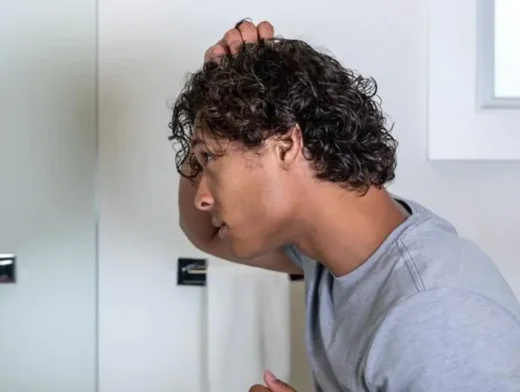As the weather heats up and summer sets in, many men start to notice something troubling in the mirror or in the shower drain: more hair falling out than usual. While some seasonal hair loss is normal, increased shedding during summer can be frustrating and even alarming for men of all ages.
But does summer really cause more hair loss? Is sea water damaging your hair follicles? Does wearing a hat actually make you go bald?
This article breaks down the science behind male hair loss in summer, explores the environmental and biological causes, and offers effective hair care strategies to protect your hair health through the hottest months of the year.

Does Hair Loss Increase in Men During Summer?
Yes, it can but it’s usually temporary and part of a seasonal cycle. Just like animals shed their coats in warm weather, humans also experience seasonal hair shedding, especially in late spring and summer.
This condition is known as:
Telogen effluvium – a state where more hair follicles enter the resting (telogen) phase of the hair growth cycle, causing increased shedding.
While this process is natural, it can be more noticeable in men, especially if they already have:
- Genetic predisposition to male pattern baldness
- Stress or dietary imbalances
- A history of scalp sensitivity or sunburn
- High exposure to chlorinated water or UV radiation
It’s important to distinguish between seasonal hair shedding, which is reversible, and androgenetic alopecia, which is progressive and permanent.
Why Does Hair Fall Out More in Summer?
There are several biological and environmental reasons why hair shedding may increase during hot weather:
1. UV Radiation and Sun Exposure
Prolonged sun exposure can damage the scalp and weaken hair proteins, making strands more brittle and prone to breakage. UV rays also stress the skin’s barrier function, which can lead to inflammation or flaking.
2. Excessive Sweating
Sweat builds up on the scalp and may clog hair follicles. Combined with outdoor pollutants, this can lead to scalp irritation and inflammation, which contribute to hair loss over time.
3. Changes in Scalp Oil Production
Hot weather stimulates sebaceous glands, which produce more oil. This may lead to:
- Greasy scalp
- Fungal overgrowth
- Increased hair follicle miniaturization if untreated
4. Higher Testosterone Levels
Some research suggests that testosterone levels are slightly elevated in summer, which can accelerate DHT-related hair loss in genetically predisposed men.
5. Lifestyle Changes
- Less sleep
- Poor diet
- More alcohol or caffeine
- Dehydration
All of these can affect hair follicle health and growth cycles.
Does Sea Water Cause Hair Loss?
Sea water doesn’t directly cause hair loss, but it can contribute to hair damage if not managed properly.
How Saltwater Affects Hair:
- Dries out the hair shaft, making it more fragile
- Roughens the cuticle, leading to split ends
- Can exacerbate scalp dryness or eczema in sensitive individuals
- Makes hair more vulnerable to UV damage, especially after sun exposure
Prevention Tips:
- Wet your hair with fresh water before swimming to reduce salt absorption
- Use a leave-in conditioner or UV-protective hair serum
- Rinse with clean water immediately after swimming
If you already have thinning hair, saltwater damage can amplify the appearance of volume loss but it doesn’t kill hair follicles directly.
Does Wearing a Hat Cause Hair Loss?
This is a long-standing myth. Wearing a hat does not cause hair loss unless it’s extremely tight and worn for excessive periods.
What can happen:
- Tight hats or helmets may cause mechanical friction or traction alopecia around the hairline if worn constantly
- Dirty or sweaty hats can harbor bacteria, leading to scalp inflammation or folliculitis
- Hats may trap heat and moisture, which contributes to oily buildup and fungal issues if scalp hygiene is poor
So while hats are generally safe, make sure to:
- Wash them regularly
- Choose breathable, non-constrictive materials
- Give your scalp time to air out daily
And remember hats actually protect the scalp from UV damage, which is one of the real risks for summer-related hair thinning.
How Should Men Care for Their Hair in Summer?
Summer hair care for men should focus on protection, hydration, and scalp hygiene.
Summer Hair Care Tips for Men:
✅ Use a Gentle, Sulfate-Free Shampoo
Clean your scalp without stripping natural oils. Wash 3–4 times per week if sweating is heavy.
✅ Avoid Overwashing
Daily shampooing can dry out the scalp, trigger more oil production, and weaken the hair shaft.
✅ Apply Leave-In Conditioner or Hair Serum
Especially before sun exposure or swimming. Choose formulas with UV filters and natural oils like argan or jojoba.
✅ Exfoliate the Scalp Weekly
Use a scalp scrub or brush to remove dead skin cells and sebum buildup.
✅ Stay Hydrated
Water is essential for healthy skin and hair follicles. Dehydration makes hair look dull and lifeless.
✅ Get Regular Hair Trims
Cutting away damaged ends helps reduce breakage and improves the appearance of thickness.
✅ Avoid Heat Styling and Chemical Treatments
The sun already dries your hair, don’t add flat irons, bleach, or harsh dyes on top of it.
Does Vitamin Deficiency Make Summer Hair Loss Worse?
Yes. Vitamin and mineral deficiencies can intensify seasonal hair shedding, especially when paired with environmental stressors like UV rays or dehydration.
Key Nutrients for Hair Health:
- Vitamin D: Regulates hair follicle cycling. Despite summer sun, excessive sunblock use or indoor habits can lead to deficiency.
- Biotin (Vitamin B7): Supports keratin production.
- Zinc: Needed for tissue repair and oil gland function.
- Iron: Carries oxygen to follicles. Low levels cause diffuse thinning, especially at the crown.
- Omega-3 fatty acids: Help maintain scalp hydration and reduce inflammation.
Consider a hair-specific multivitamin if you’re experiencing seasonal hair loss, but always check with a healthcare provider before supplementing.
When to See a Doctor About Hair Loss
Most seasonal shedding resolves on its own but you should consult a doctor or dermatologist if:
- You lose more than 100–150 hairs per day consistently
- Hair falls out in patches or with scarring
- You see scalp redness, pain, or flaking
- Your hairline is visibly receding
- You have other symptoms like fatigue or brittle nails
Early intervention is key in preventing permanent hair loss and maintaining healthy follicles.
Advanced Hair and Scalp Care at Erdem Hospital

If you’re concerned about seasonal hair loss, chronic shedding, or scalp irritation during the summer months, Erdem Hospital in Istanbul offers expert diagnostic and therapeutic care for men. Our dermatologists and hair restoration specialists provide scalp analysis, blood tests, PRP treatments, mesotherapy, and personalized hair care plans backed by over 37 years of clinical excellence. Whether it’s stress-induced shedding or male pattern baldness, Erdem Hospital helps you protect, preserve, and restore your hair season after season.